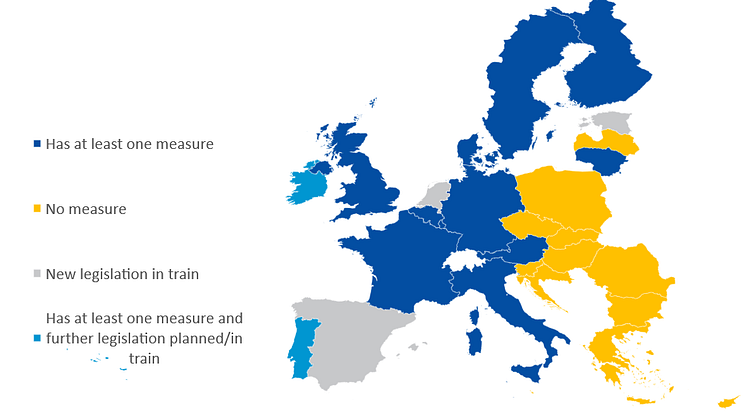
Blog post -
Member States are dawdling on gender pay transparency
The gender pay gap in gross hourly earnings in the EU was 14.8% in 2018. To help combat discriminatory pay practices by employers, the European Commission recommended in 2014 the introduction of pay transparency measures in all Member States. But more than half still have not implemented any such measures. Ursula von der Leyen announced in 2019 the Commission’s intention to table measures introducing binding pay transparency measures as part of new anti-discrimination legislation. Where do Member States currently stand on the agenda?
Early adopters
The first measures requiring companies to disclose information about the pay of their female and male employees were implemented by the Scandinavian Member States along with Italy in the 1990s and early 2000s. They were followed by Austria, Belgium and France in the early 2010s.
To spur the remaining 21 into action, in 2014, the European Commission issued a non-binding Recommendation on Pay Transparency, encouraging Member States to introduce at least one of the following three measures:
- giving employees the right to obtain information on pay levels in their workplace, broken down by gender for categories of employees doing the same work or work of equal value
- requiring companies to produce pay reports describing the average pay by category of employee or position, broken down by gender
- requiring companies to conduct pay audits with detailed analysis of pay differences between men and women by category of employee or position, as well as detailed information on pay and pay differentials on grounds of gender
The recommendation also proposed that the issue of equal pay could be dealt with in collective bargaining.
- European Commission: Recommendation on Pay Transparency (2014/124/EU)
- European Commission: Implementation Report (2017/671 final)
Later adopters
Following the recommendation, Germany, Lithuania and the United Kingdom passed legislation requiring companies to produce pay reports, and Germany also legislated for the right to obtain information and non-mandatory pay audits.
Five more Member States – Estonia, Ireland, the Netherlands, Portugal and Spain – are advancing legal proposals, yet none have come to the stage of implementation. Indeed, several are still stuck in the legislative process.
The Estonian government in 2018 approved legislation giving the labour inspectorate the authority to look for discrimination in the wage data of public sector organisations. This was planned to enter into force from 1 July 2020, but in March 2019, a new government took office and dropped the amendment from the parliamentary procedures.
The Irish government has introduced a Gender Pay Gap Information Bill, obliging employers to publish pay reports annually. The Bill is now in the second of the five stages it has to go through before being enacted.
In the Netherlands, the proposal for legislation on pay transparency was put on hold in the 2018 parliamentary debate; a new proposal was submitted in March 2019 by four opposition parties.
Portugal, which has obliged state-owned companies to compile pay reports since 2014, introduced legislation in 2018 extending obligatory reporting and auditing to private companies. But implementation is still pending and has been further postponed due to the COVID-19 pandemic.
In Spain, a Royal Decree from 2019 introduced a package of measures to enhance transparency in private companies. But this just provides a general framework, so further legislation was needed to set out control mechanisms and penalties. In July, the two most representative trade unions (CCOO and UGT) agreed to support the draft legislation; employer organisations were also invited to the social dialogue but did not sign. On 14 October, the Spanish government published the new regulation.
Italy, which has obliged employers to report on pay as part of a broader gender equality report since 1991, has recently sought to advance the matter. A new legislative proposal from 2016 calls for the introduction of explicit anti-pay discrimination requirements for companies taking part in publicly funded work. A second proposal seeks to establish rules for pay transparency measures, but this has neither been discussed nor adopted.
Laggards
To date, 12 Member States have implemented none of the three measures and have no plans to do so: Bulgaria, Croatia, Cyprus, Czechia, Greece, Hungary, Malta, Latvia, Romania, Poland, Slovakia and Slovenia. The COVID-19 pandemic may have put a brake on some taking action, as other priorities have emerged. For others, delays have occurred due to internal political debates, pre-dating COVID. Another possibility is that the European Commission’s plan to regulate at EU level has prompted some Member States to adopt a wait-and-see position. The expectation is that the topic of equal pay will re-emerge in 2021–2022, and at national level too, once the current health crisis has abated and the Commission’s proposal for further action has been presented.
Additional information:
- Publication: Minimum wages in 2020 - Annual review
- Topic page: Minimum wage
- Publication: Pay transparency in Europe: First experiences with gender pay reports and audits in four Member States
- Working paper: Measures to promote gender pay transparency in companies: How much do they cost and what are their benefits and opportunities?



